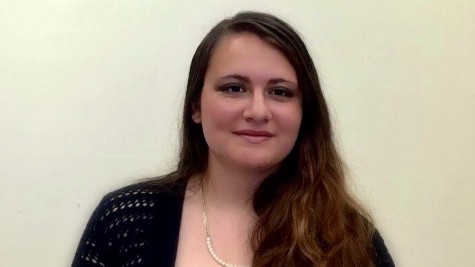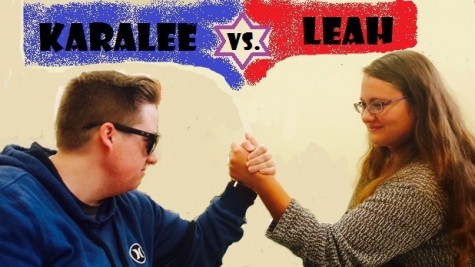Karalee vs. Leah: Should Lakeland require community service to graduate?
September 28, 2015
Some Lakeland College courses require several hours of volunteer work or a student as practitioner project that benefits the community. Here’s what our columnists had to say when asked whether this is a reasonable requirement:

Karalee Manis: NO.
Community service is a great thing. It allows people to come together for some greater good and give of themselves to benefit others. It is a noble notion; an admirable activity.
However, not all community service is voluntary: some is court ordered for criminal offenders. It is placed upon them as a consequence of bad behavior, maybe even as a lesser option of punishment.
That being said, I am neither a willing volunteer nor am I a criminal.
I am a college student.
I am a person who learned that, in order to pass a Core III class and thus graduate, I must do a community service project.
I don’t have anything against voluntary community service, so long as it is voluntary.
So why am I being forced into this activity?
Lakeland College, as part of its identity, thinks community service is“a very important part of a student’s overall development into a well-rounded, civic-minded citizen.”
The first part of that quoted sentence also claims that Lakeland “encourage(s) our students to participate” in such projects.
Am I not capable of being a good citizen without such a project?
Now, if you’ve been here since freshman year, this isn’t really news to you. Sure, you may have not quite liked being forced to participate in “Building Bridges” during your first week, but, I assume, you participated.
I am a transfer student so I was not inducted into the college in such a way. My first Core class was Core II, and until the first day of my Core III class, I had no idea this mandatory community service was in my future.
And sure, maybe it’s not totally ‘mandatory.’ You don’t have to do it, but that would drastically affect your grade; you may not pass the class in this case.
So, how ‘voluntary’ does it seem now?
Here’s my issue: I am so damn busy this semester I can barely imagine carving any extra time out of my packed schedule to go volunteer somewhere enough times to total at least 10 hours. I barely have enough time for homework and sleep as it is.
Let’s say, objectively, you work out between you and whatever organization you volunteer for, that you can do one hour a week. Then add in travel time, because it can’t be on campus. Do you even have a car? Maybe it takes you a half hour to drive there; that’s now a total time commitment of two hours for every one hour needed. And after you’ve done that, you have to do that nine more times.
Another aspect that makes this an unfair requirement is that it’s not the same for every Core III class.
In my class, it is up to us to do it all on our own: form a group, find an organization, set up when the group can do it, and then go do it.
In other classes, it’s all built in for you, easy as possible. The teacher has a project; you all just show up and help him out. How simple is that?
Despite the level of expected independence across the various classes, we’re still expected to perform a voluntary act for the community. In itself, that’s not such a bad thing; unless that action is involuntary.
The act of forcing something like this upon us is analogous to criminal offenders being sentenced to community service as their consequence for whatever bad or idiotic thing they did.
I didn’t do anything bad; I chose to attend college.
I intended to use my time as best I could which meant putting in the work it takes to study and learn and keep up with homework.
Now a significant chunk of that time is being taken away from me.
If I’m expected to spend three hours of study time for every hour of class time, when exactly am I supposed to do this?
I have 14 credits right now (many students have 15-18). One of those is an internship that requires and will take a minimum of 50 hours. Another is this fine publication, for which I am also a copy editor. That means more time devoted to this class, which I am perfectly happy to do as it is something I chose.
That’s the key: choice.
If the college says the community service is encouraged as it “aligns with our identity as a college,” why is an encouragement – a choice – now a requirement?
By that logic, why aren’t other similarities being required to graduate?
Lakeland’s religious identity is with the United Church of Christ. Are we all going to be forced to practice and attend services of this faith?
Lakeland’s sports identity is with that of the Muskie as our mascot. Is it mandatory I wear Lakeland Muskie regalia so that I can graduate?
I think it’s safe to assume most of the student body are fine, upstanding citizens; good people. But when you force good people to do something, sometimes there are consequences. If someone resents this requirement or is not too enthusiastic to be doing the community service, do we really want them to be doing it? And what about those people who aren’t as easy going about this prospect; how might they react or behave in this endeavor?
What if a student has issues that might make such a project a tax on their mental health? Do you honestly think I, an anxiety-prone individual more at risk in unknown social situations, really want to put myself in such a position? I’m already stressed out as it is; now I have to add in an unfavorable situation, just so I can pass a required class?
Does the college just gamble on the hope that there won’t be any problems when this sort of requirement is thrust upon students without choice and carrying conditions? Is this a risk ignored in favor of an ideal image?
Yes, I came to college–-to Lakeland–-to learn and grow and become a well-rounded person; to give myself an advantage in life from a place I believe can give me that.
But, I did not come here to be bullied into something I do not feel is fair and I certainly did not come hereto compromise my overall success.

Leah Ulatowski: YES.
For how much the majority of college students seem to profess their progressive, humanitarian spirits, there is certainly a lot of griping about the small amount of community service required by various Lakeland College courses.
Maybe it is because I’ve always attended small churches where others volunteered me for all kinds of odds and ends, or perhaps it’s due to the fact that I had to earn 180 volunteer work hours over the course of two semesters to graduate from my high school, but I don’t think Lakeland asks that much of us.
As a conservative, I strongly oppose any higher authority forcing me to do anything against my will, but this is a positive requirement of the college’s curriculum, and the fact of the matter is, most students would not volunteer their time unless made to do so.
I know there are some exceptionally generous college students, but overall, our generation is slipping away to a world of hashtag activism.
We’re so busy looking for applause on Facebook with sentimental speeches about the less fortunate and wasting our breath criticizing the country’s leaders for failing to make a change that we’ve forgotten our own capability to help the communities we live in.
Too many of us believe that Democrats will magically help everyone struggling in this country if we simply increase taxes on the wealthy; it is terribly easy to sit back and assume idleness when we’ve oversimplified the problem. We need to dream bigger and have greater faith in our own power to invoke change because such a mindset will fuel our charitable actions.
It probably sounds crazy, but I believe we could potentially eliminate the welfare system in this nation if we all just gave a little more of our resources and time, and maybe the first step is re-teaching our generation the basic idea of volunteer work, which never should have been allowed to go to the wayside.
We could sit around and brainstorm a million excuses as to why college students can’t be bothered with community service, but each reason is entirely refutable.
Even if some students don’t have transportation, let’s be honest, they find a way when it comes to getting to the bar, strip club or night club, so they could probably find a means of transportation to a church, nursing home or homeless shelter by employing equal effort. If all else fails, the free Lakeland shuttle is always available.
Along the same lines, we all claim to have no time to even breathe, and maybe that’s true, but we tend to make time for Netflix binges and dancing cats on Youtube, so why not volunteer work?
Finally, I know that anxiety and other mental health concerns are very real in a world of improved diagnoses, but we cannot allow discomfort, fear and social anxiety to stop us from gaining volunteer experience and, ultimately, impacting our world.
Believe me, I am probably the most awkward turtle ever; I’ve always struggled with anxiety and obsessive compulsive disorder, not to mention that I was home schooled until college and became terribly shy.
Nevertheless, I branched out and helped my community—not because my symptoms were less severe, but because I decided to start doing things that terrified me until such situations stopped making me sick and started to become natural.
In the end, I had the satisfaction of knowing that I helped children at my church, whether it was informing them not to discuss poop in polite company, teaching some to read at their grade level after their curriculum failed them, or sharing the love of Jesus with the ones that had never felt wanted before.
I also learned to speak to the elderly and individuals with disabilities in a way that piques their interest and affords them personhood rather than speaking down to them or using overly sympathetic tones.
All of these skills have helped me improve my interviewing skills, which serve me well in the journalism field.
In short, I do not believe Lakeland is stripping us of our rights with required community service. Rather, the school is providing students with an incredible opportunity to take action, change someone’s life and gain valuable skills—an opportunity that has and will always be available, but one that too many people can go their entire lives without ever exploring.
We are some of the most privileged people on Earth to have a chance at higher education, so let’s share our resources and time with those less fortunate.


